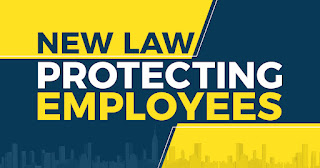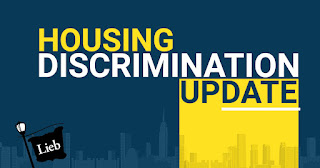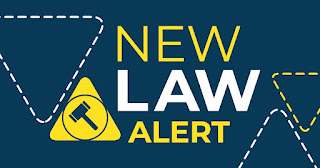We just got some guidance from the State as to a law that became effective March 2, 2021 about noticing tenants of their rights to reasonable modifications / accommodations under the Human Rights Law. To learn about the law, read our blog from that date here. After the law was passed, it was than repealed and replaced. To learn about the repeal and replace, read our blog here.
The repealed and replaced version of the law stated that "The Division of Human Rights shall promulgate regulations."
Today, we learned about those proposed regulations, which will be set forth at 9 NYCRR 466.15 when effective.
466.15 Provision of notice by housing providers of tenants’ rights to reasonable modifications and accommodations for persons with disabilities.
(a) Statutory Authority. Pursuant to N.Y. Executive Law section 295.5, it is a power and a duty of the Division to adopt, promulgate, amend and rescind suitable rules and regulations to carry out the provisions of the N.Y. Executive Law, article 15 (Human Rights Law) and pursuant to New York Executive Law section 170-d, the New York State Division of Human Rights “shall promulgate regulations requiring every housing provider …to provide notice to all tenants and prospective tenants … of their rights to request reasonable modifications and accommodations” as such rights are provided for in Human Rights Law sections 296.2-a(d) and section 296.18.
(b) Effective date. Executive Law section 170-d was effective March 2, 2021, pursuant to the Laws of 2021, chapter 82, section 4, by reference to the Laws of 2020, chapter 311.
(c) Definitions.
(1) “Housing provider” shall mean:
(i) “the owner, lessee, sub-lessee, assignee, or managing agent of, or other person having the right to sell, rent or lease a housing accommodation, constructed or to be constructed, or any agent or employee thereof” as set forth in New York Executive Law, article 15 (hereinafter “Human Rights Law”) section 296.5; or
(ii) “the owner, lessee, sub-lessee, assignee, or managing agent of publicly-assisted housing accommodations or other person having the right of ownership or possession of or the right to rent or lease such accommodations” as set forth in Human Rights Law section 296.2-a.
(2) “Housing accommodation” includes “any building, structure, or portion thereof which is used or occupied or is intended, arranged or designed to be used or occupied, as the home, residence or sleeping place of one or more human beings” as set forth in Human Rights Law section 292.10.
(3) “Publicly-assisted housing accommodations” shall include:
(i) “public housing” as set forth in Human Rights Law section 292.10(a);
(ii) “housing operated by housing companies under the supervision of the commissioner of housing” as set forth in Human Rights Law section 292.10(b); or
(iii) other publicly-assisted housing as described in Human Rights Law section 292.10(c), (d) and (e).
(4) “Property Manager” as referenced in the sample notice is an individual housing provider, or such person as the housing provider designates for the purpose of receiving requests for reasonable accommodation.
(5) “Reasonable modifications or accommodations” shall refer to those actions required by Human Rights Law section 296.2-a(d) and Human Rights Law section 296.18, which makes it an unlawful discriminatory practice for a housing provider or publicly-assisted housing provider:
(i) To refuse to permit, at the expense of the person with a disability, reasonable modifications of existing premises occupied or to be occupied by the said person, if the modifications may be necessary to afford the said person full enjoyment of the premises, in conformity with the provisions of the New York state uniform fire prevention and building code, except that, in the case of a rental, the landlord may, where it is reasonable to do so, condition permission for a modification on the renter’s agreeing to restore the interior of the premises to the condition that existed before the modification, reasonable wear and tear excepted.
(ii) To refuse to make reasonable accommodations in rules, policies, practices, or services, when such accommodations may be necessary to afford a person with a disability equal opportunity to use and enjoy a dwelling, including the use of an animal as a reasonable accommodation to alleviate symptoms or effects of a disability, and including reasonable modification to common use portions of the dwelling, or
(iii) In connection with the design and construction of covered multi-family dwellings for first occupancy after March thirteenth, nineteen hundred ninety-one, a failure to design and construct dwellings in accordance with the accessibility requirements of the New York state uniform fire prevention and building code, to provide that:
(a) The public use and common use portions of the dwellings are readily accessible to and usable by disabled persons with disabilities;
(b) All the doors are designed in accordance with the New York state uniform fire prevention and building code to allow passage into and within all premises and are sufficiently wide to allow passage by persons in wheelchairs; and
(c) All premises within covered multi-family dwelling units contain an accessible route into and through the dwelling; light switches, electrical outlets, thermostats, and other environmental controls are in accessible locations; there are reinforcements in the bathroom walls to allow later installation of grab bars; and there are usable kitchens and bathrooms such that an individual in a wheelchair can maneuver about the space, in conformity with the New York state uniform fire prevention and building code.
(d) Actions required by Executive Law section 170-d.
(1) Housing providers must provide notice, as provided for in this regulation, to all tenants and prospective tenants:
(i) within 30 days after the effective date of their tenancy;
(ii) for current tenants, within thirty days after the effective date of Executive Law section 170-d;
(iii) for prospective tenants, see below (d)(5) regarding how to provide notice for available housing accommodations.
(2) The notice is to advise individuals of their right to request reasonable modifications and accommodations for disability pursuant to Human Rights Law section 296.2-a(d) (publicly-assisted housing) or Human Rights Law section 296.18 (private housing).
(3) Such notice shall be in writing, shall be in 14 point or other easily legible font.
(4) New and current tenants. Such notice must be provided individually to all new and current tenants, and shall be provided in the following manner:
(i) by electronic transmission (e.g. email) if electronic transmission is available and can be directed to the individual to be notified, or
(ii) by providing a paper notice to the individual, if electronic transmission is not available, and
(iii) may be accomplished by including the notice in or with other written communications, such as a lease or other written materials routinely provided to tenants.
(iv) “Posting” of the notice, either on paper on a bulletin board, or on an electronic bulletin board or notice area, or by providing a link to such posting, shall not be sufficient notice.
(5) Notice with regard to available housing accommodations.
(i) Such notice must be included with any posting, listing, advertisement, brochure, prospectus, rental application, proposed lease or other similar communication about an available housing accommodation.
(ii) Where such communication is by electronic means other than email, the notice may be included by providing a link to a page containing the notice language. The link must be clearly identified as linking to the “Notice disclosing tenants’ rights to reasonable accommodations for persons with disabilities.” The notice must be available for printing and downloading.
(iii) Where such communication is in paper form, the notice must be included within such communication, or by providing the notice in an accompanying document.
(iv) Where such communication is sent by email, such email shall include the notice, either in the body of the email or in an attachment.
(e) Content of the required notice. The following shall be deemed sufficient notice when provided to the individual to be notified.
NOTICE DISCLOSING TENANTS’ RIGHTS TO REASONABLE ACCOMMODATIONS FOR PERSONS WITH DISABILITIES
Reasonable Accommodations
The New York State Human Rights Law requires housing providers to make reasonable accommodations or modifications to a building or living space to meet the needs of people with disabilities.
For example, if you have a physical, mental, or medical impairment, you can ask your housing provider to make the common areas of your building accessible, or to change certain policies to meet your needs.
To request a reasonable accommodation, you should contact your property manager by calling ——— or ———, or by e-mailing ———. You will need to show your housing provider that you have a disability or health problem that interferes with your use of housing, and that your request for accommodation may be necessary to provide you equal access and opportunity to use and enjoy your housing or the amenities and services normally offered by your housing provider. If you believe that you have been denied a reasonable accommodation for your disability, or that you were denied housing or retaliated against because you requested a reasonable accommodation, you can file a complaint with the New York State Division of Human Rights as described at the end of this notice.
Specifically, if you have a physical, mental, or medical impairment, you can request:*
Permission to change the interior of your housing unit to make it accessible (however, you are required to pay for these modifications, and in the case of a rental your housing provider may require that you restore the unit to its original condition when you move out);
Changes to your housing provider’s rules, policies, practices, or services;
Changes to common areas of the building so you have an equal opportunity to use the building. The New York State Human Rights Law requires housing providers to pay for reasonable modifications to common use areas.
Examples of reasonable modifications and accommodations that may be requested under the New York State Human Rights Law include:
If you have a mobility impairment, your housing provider may be required to provide you with a ramp or other reasonable means to permit you to enter and exit the building.
If your doctor provides documentation that having an animal will assist with your disability, you should be permitted to have the animal in your home despite a “no pet” rule.
If you need grab bars in your bathroom, you can request permission to install them at your own expense. If your housing was built for first occupancy after March 13, 1991 and the walls need to be reinforced for grab bars, your housing provider must pay for that to be done.
If you have an impairment that requires a parking space close to your unit, you can request your housing provider to provide you with that parking space, or place you at the top of a waiting list if no adjacent spot is available.
If you have a visual impairment and require printed notices in an alternative format such as large print font, or need notices to be made available to you electronically, you can request that accommodation from your landlord.
Required Accessibility Standards
All buildings constructed for use after March 13, 1991, are required to meet the following standards:
Public and common areas must be readily accessible to and usable by persons with disabilities;
All doors must be sufficiently wide to allow passage by persons in wheelchairs; and
All multi-family buildings must contain accessible passageways, fixtures, outlets, thermostats, bathrooms, and kitchens.
If you believe that your building does not meet the required accessibility standards, you can file a complaint with the New York State Division of Human Rights.
How to File a Complaint
A complaint must be filed with the Division within one year of the alleged discriminatory act. You can find more information on your rights, and on the procedures for filing a complaint, by going to www.dhr.ny.gov, or by calling 1-888-392-3644 with questions about your rights. You can obtain a complaint form on the website, or one can be e-mailed or mailed to you. You can also call or e-mail a Division regional office. The regional offices are listed on the website.
* This Notice provides information about your rights under the New York State Human Rights Law, which applies to persons residing anywhere in New York State. Local laws may provide protections in addition to those described in this Notice, but local laws cannot decrease your protections.
You have until June 13, 2021 to comment on these proposed regulations by emailing: caroline.downey@dhr.ny.gov













